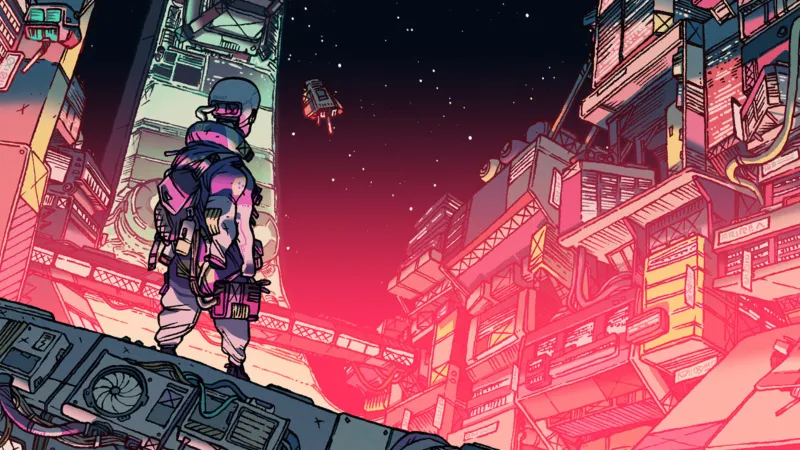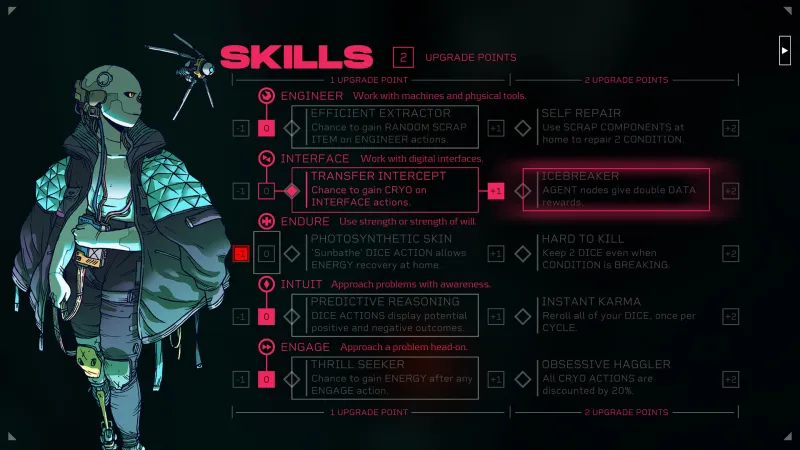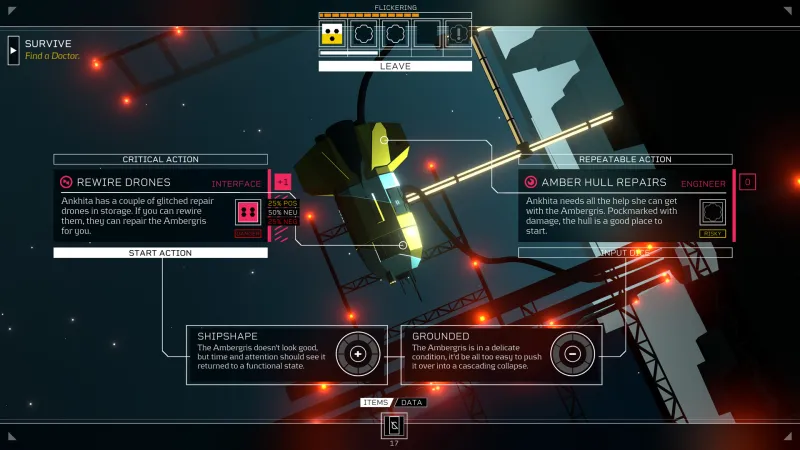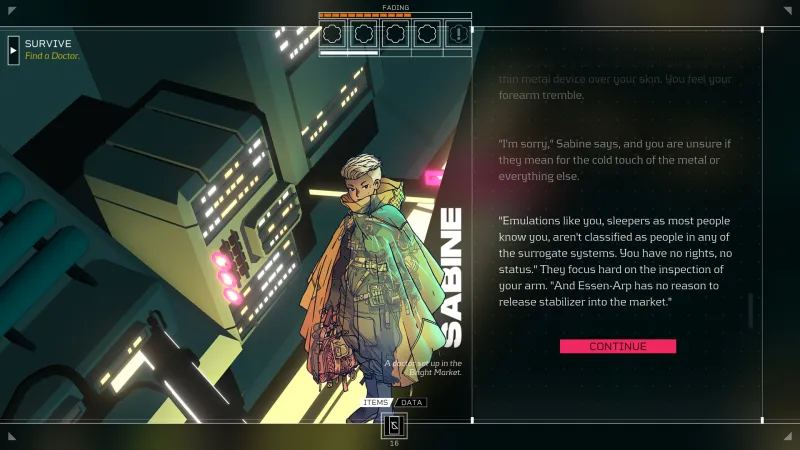
When I booted up Citizen Sleeper last night, I had no idea what I was in for. I had seen some buzz about it online and figured I’d give it a go – it was on Xbox Game Pass, after all, and the key art looked precisely the slick and punchy cyberpunk/sci-fi aesthetic I especially like. Little did I know, a few hours later, I’d be playing a game that I’d recommend to anyone at this point.
Now, I’m about four hours in, and there’s the potential to crash and burn, but something tells me it’s not going to. Citizen Sleeper, as a game, is somewhat hard to explain: It’s a sci-fi, narrative RPG with no combat (at least so far), a dice-rolling mechanic that dictates everything, minor survival systems, and a rotating cast of characters that you’ll immediately want more of upon meeting them. You interact with a circular space station/sci-fi metropolis where the game is set from a zoomed-out, almost god hand-like perspective.
None of this adds up to something you can picture in your head, right? That’s what I went through when I read the description of it on Game Pass, and the curious confusion you’re (hopefully) feeling is what I was feeling after reading various tweets calling Citizen Sleeper a great game. Instead of trying to sell you on all that right now, let me tell you the premise of Citizen Sleeper, which damn near sent me into an existential spiral and immediately captured my interest. In what felt like moments, 7 p.m. became 11 p.m. last night, and I grouchily put myself to bed, desperate to play more, because I’m a responsible adult sometimes.
You are a Sleeper, a digitized consciousness implanted into an artificial body – basically a robot with someone else’s mind. That someone else is, well, yourself. The real you sold their consciousness to a mega-corporation (we’re talking a Blade Runner cyberpunk corporation here) so that they could use it, in an artificial body, to work for them. However, you’ve escaped, and now the suits want you back. That escape scenario is fine, and it sets up the stakes of Citizen Sleeper quite well, but the idea that you are a copy of your real self, who sold you to work for a mega-corp, is a concept I can’t get out of my head.

Imagine waking up, cold and void of real life, just a shell of what you know a human to be. Except you don’t know what a human should be; you only have an idea about the experience. Instead, you’re a robot possessing memories that feel like yours, but you know aren’t yours at all. You contain the feelings and sensations of the human body and mind that gave you away. By design, you’re forced to despise the real you. How could you do this to yourself? Why did you do this to yourself? Would you care about an artificial body with a copy of your conscious, seemingly lightyears away, or are you fine pawning off your mind for a quick buck? These are the questions Citizen Sleeper has racking around in my brain, and it’s what drives the narrative of this tabletop RPG-turned-video game.
The game unfolds over cycles aboard Erlin’s Eye, the circular space station I mentioned earlier. As a Sleeper, your body is constantly deteriorating, and it’s supposed to – the corporation that owns you built that drawback to keep you coming back to them because only they sell what you need to restore your health. The worse your artificial body’s status, the worse dice you’re dealt at the start of each cycle. These dice dictate everything – to do almost any action, you roll a dice. The outcome is either positive (with effects such as filling and completing an objective bar), neutral (perhaps nothing happens), or negative (maybe you lose energy). Better dice raise the chances of a beneficial roll, and naturally, worse dice lead to adverse outcomes more often.

Let me run you through what a cycle might look like to help you better grasp this: Your condition is good this morning, so you wake up with two really good dice, one average dice, and two not-so-great dice. To ensure your condition is solid tomorrow, you need to complete a task on the station that gets you more of the game’s currency. You roll an average-level dice because you don’t need a lot of money – just a decent amount. You get the money you need, so you head to the station’s doctor to restore your health. Now you head to another objective. You’re helping someone fix a ship. Rolling positively progresses the repairs but rolling negatively pushes it further to falling off the edge and crumbling into space. Hence, it’s crucial to roll positively or at least neutral. You use one of your really good dice to guarantee a positive outcome. Yay!
You then notice your energy is running low – if it depletes, you begin starving, which weakens your condition or health. So you head to a food stall to restore your energy. You use your remaining dice on other objectives, and when you’ve depleted all your dice, there’s nothing left for you to do. So you return to your “home” and end the cycle. You wake up and do it repeatedly, with different dice, objective progression goals, and different people to meet and interact with.
It’s a mechanic that makes more sense after playing it a bit, and I highly recommend not sweating over it. Just play the game, and it will all click into place. And when it does, you’ll be rewarded with a fascinating narrative that effectively accentuates the stress of simply trying to survive within the confines of space capitalism, the idea of self-ownership, and the concept of making a new life out of the hand you’ve been dealt, no matter how useless it might feel.

I’m not exactly sure where Citizen Sleeper is going, but I’m fascinated by its premise and gameplay design. It features beautiful art and what I’d call this year’s best soundtrack, too, so playing it is an especially great time. If none of this has convinced you to give it a try – mind you, it’s also on Xbox Game Pass, so if you’re already a subscriber, checking it out will only cost you your time – I’d still say give it a shot. On paper, I would not have said Citizen Sleeper would be a Wesley game, but after four hours with it, it’s all I want to play.
Citizen Sleeper is out now on Xbox Series X/S, Switch, and PC.
Have you played Citizen Sleeper? Let us know what you think of it in the comments below!


